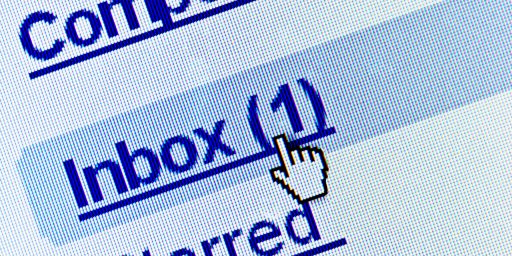Email Era Over?
“Email has had a good run as king of communications. But its reign is over.” So begins a column by Jessica Vascellaro in today’s WSJ.
We all still use email, of course. But email was better suited to the way we used to use the Internet—logging off and on, checking our messages in bursts. Now, we are always connected, whether we are sitting at a desk or on a mobile phone. The always-on connection, in turn, has created a host of new ways to communicate that are much faster than email, and more fun.
Why wait for a response to an email when you get a quicker answer over instant messaging? Thanks to Facebook, some questions can be answered without asking them. You don’t need to ask a friend whether she has left work, if she has updated her public “status” on the site telling the world so. Email, stuck in the era of attachments, seems boring compared to services like Google Wave, currently in test phase, which allows users to share photos by dragging and dropping them from a desktop into a Wave, and to enter comments in near real time.
[…]
Years ago, we were frustrated if it took a few days for a letter to arrive. A couple of years ago, we’d complain about a half-hour delay in getting an email. Today, we gripe about it taking an extra few seconds for a text message to go through. In a few months, we may be complaining that our cellphones aren’t automatically able to send messages to friends within a certain distance, letting them know we’re nearby. (A number of services already do this.)
These new services also make communicating more frequent and informal—more like a blog comment or a throwaway aside, rather than a crafted email sent to one person. No need to spend time writing a long email to your half-dozen closest friends about how your vacation went. Now those friends, if they’re interested, can watch it unfold in real time online. Instead of sending a few emails a week to a handful of friends, you can send dozens of messages a day to hundreds of people who know you, or just barely do.
[…]
David Liu, an executive at AOL, calls it replacing the in-box with “a river that continues to flow as you dip into it.”
I’m more “wired” than most, spending an inordinate amount of time blogging, Twittering and the like. Indeed, I started this blog nearly seven years ago as a substitute for my previous habit of emailing links and clippings, often with brief commentary, back and forth my my friends. I frequently instant message or direct message people for things that need immediate responses.
But none of it is going to replace email.
A river of information is interesting. It’s why I finally “stuck” as an active Twitter user after two years of brief flirtations and not “getting” it. But, even if you’re only following 100 people or so, you’re going to miss most of what’s in the river. And if you’re following 1000 or 2000 people — hardly uncommon — you’re going to miss almost all of it. Which is perfectly fine if you’re looking for witty commentary, updates on the latest breaking news, which of your acquaintances out and about in Adams Morgan, and the like.
While it can be used that way, email isn’t, at its core, a mass communications platform. It’s a means of direct communication with another person asynchronously. If I need to let my wife know I’m running late, send my deputy an attachment for posting on the company website, send my folks the latest pictures of the baby, or any number of things that I actually need another person to read — not just have available to them if they happen to be wading in my river at a given moment — there’s no good substitute for email.
Twitter direct messaging is great if you can say what you need in 160 characters, including spaces, and the person’s following you on Twitter; otherwise, not so much. Texting is rather intrusive and, since it tends to set off audible alarms and cost the recipient money, borderline rude. Instant messaging is also generally annoying, as it demands a person’s attention NOW rather than when they want to take the time to read messages. Ditto telephoning, which I now reserve almost exclusively for extended conversations with friends and family a long distance away, quick bursts for when I can’t wait for email, or certain types of business transactions.
I haven’t yet used Google’s Wave, which may streamline the current flow of the river and avoid some of the fallbacks of the email alternatives. The way we’ll use email will continue to evolve, too, much as I’ll now send someone to a blog post or an online photo album. But we’ll always need something like email: a direct, asynchronous means of sending infinitely variable types of information to specific people.
Update (Alex Knapp): Reading the above, I would just note that this is one in a string of articles over the past few years about the death of email, the death of voicemail, the death of the telephone, etc. These pieces tend to have one thing in common: they are written by tech journalists who, in their day to day business, are sifting through the constant stream of information on the Internet. You will note that they are almost never written by people with jobs outside of that industry, because everyone else with an office job gets more email and voicemail and phone calls than they can handle without investing in any one of the number of time management programs like Getting Things Done, etc. Speaking for myself, if email is dead, why do I get 100+ of them a day? And why are they communications that really can’t be handled any other way? If the phone is dead, why do I spend so much time on it getting work done?
Before proclaiming the death of a particular type of communication, it would be nice if journalists of this ilk actually did some, you know, reporting from a regular office and not just their laptop at home.






And not everyone is all the time connected as she may think. I work in a job where constantly texting or using my computer would keep me from doing my job. Something I am pretty sure my employers might frown on a lot.
I use email for a lot of things I would have used snail mail or even the phone for years ago, but I am content with the speed of email. I think what email and the internet are really going to start killing-probably already have is the Postal Service. We pay almost all our bills online, and things I used to mail-like pictures are all done online.
Agreed with JJ and just me. E-mail is great for passing information that isn’t so urgent that you need to interrupt somebody else’s day, which is almost all information.
This goes hand-in-hand with a post form a few weeks (or months) ago by James regarding the difference in work habits between managers and designers/writers/coders/etc. The latter need a significant block of uninterrupted time to get ANYthing done.
Here here! I’ve been reading tech and gaming news sites since I was a teenager in school and I swear I’ve been seeing these same annoying articles for years. I’ve lost track of the number of times I’ve gotten into thread wars with early-adopters/tech journalists/enthusiasts for just that reason.
They act as if their idiosyncratic method of using technology is not only the norm, but the desired norm. It’s not, at least not outside of their particular subculture.
I agree, most people do not see a computer until they get home at night or are they allowed to carry their “devices” with them at their places of employment. If then normal person spends 20+ hours a week on the Internet, face book, tweeter or what ever is next, they would end up like 10% of the population, unemployed. What it has killed is the ability to carry on interpersonal conversations with some one in the same room while promoting the rudeness of the concept that someone on the other end is more important than the person in front of them trying to provide service i.e., in line at a bank, in restaurants or where ever there are innocent bystanders handy.